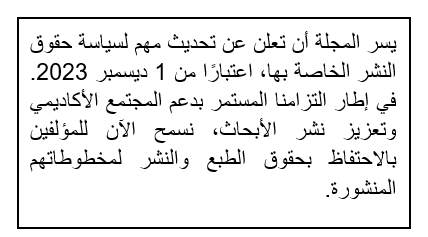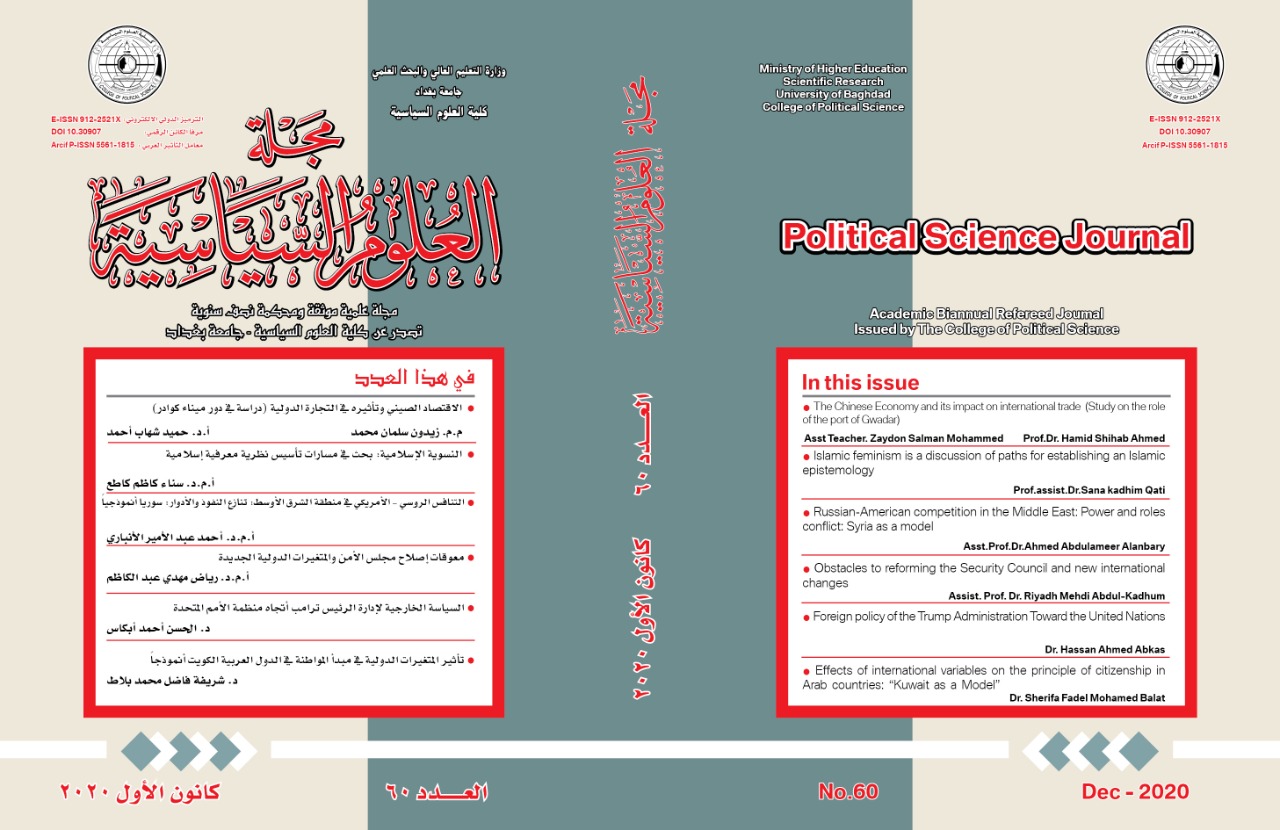منطق الموازنة في الواقعية البنيوية: الأناركية والسياسات التوسعية
DOI:
https://doi.org/10.30907/jcopolicy.vi66.671الكلمات المفتاحية:
نظرية العلاقات الدولية، الواقعية البنيوية، الأناركية، الموازنة، السياسات التوسعيةالملخص
يناقش هذا البحث منطق ميزان القوى (balance of power) في حقل العلاقات الدولية. يركّز على النسخة النظمية (systemic) من النظرية؛ لأهميتها ومركزيتها في البرنامج البحثي للواقعية ضمن التخصص. يفحص البحث متانة الحكمة التقليدية التي تجادل بأن موازنات القوى في نظام العون الذاتي (self-help) تتشكل بغض النظر عن دوافع أو نوايا الدول؛ وتظهر على نحو متكرر كنتيجة غير مقصودة لتكافل وحدات النظام الأناركي التي تسعى بالأساس إلى قوة متفوقة وليست متوازنة. هذا المنطق، وبالتتابع، يفترض ان الهيمنة (hegemonic) لا تتشّكل )أو تفشل( في نظام متعددة الدول؛ لأن تهديداتها (الفعلية أو المتصوّرة) للنظام تبث الخوف وتوّلد سلوك موازن من الدول الأخرى. يقابل البحث في هذا المنطق مع منطق آخر يرفض الإقرار بأن الموازنة (balancing) هي الحال الطبيعي للأنظمة الدولية جميعا، ويرى ان هذه الحجة لا تنجو إمبريقياً عند مقاطعتها مع التأريخ غير الأوربي. على نقيض الأول، يجادل الثاني لصالح نزعة الهيمنة والسياسات التوسعية في الحياة الدولية، ويفترض تعاقب "الهيمنات"، وليس "الموازنات"؛ لأن الأنظمة الهيراركية (hierarchy)، مثل الأناركية (anarchy)، هي بنية متينة ومستمرة. يخلص البحث الى أن الموازنة لها منطق قوي، ولكن متنازع عليه بين الواقعيين من علماء التخصص.
المراجع
Al-Asadi، Tamara Kazem, and Saad Obaid Al-Saeedi. "The Position of the America United States in the Global System after the Repercussions of the Corona Pandemic." Scientific Culture 9, no. 1 (2003): pp. 607-618.
Al-Nuaimi, Ahmed Nouri. "Modern Structuralism in International Relations." Political Sciences Journal, no. 46 (2013): pp. 39-72.
Assafi, Taazur Falah Shandookh, and Abbas Hashim Aziz. "Concept of Conflict and Identifying a Form Cr Sippabio (Conceptual and Theoretical Framework)." Social Science Journal 12, no. 4 (2002): pp. 2509-2524.
Brooks, Stephen G., and William C. Wohlforth. 2008. World out of Balance: International Relations and the Challenge of American Primacy. Princeton, NJ: Princeton University Press.
Butterfield, Herbert. 1951. History and Human Relations. London: Collins.
Davidson, Jason W. 2006. The Origins of Revisionist and Status-Quo States. New York: Palgrave Macmillan.
Doyle, Michael W. 1997. Ways of War and Peace: Realism, Liberalism and Socialism. New York: W.W. Norton & Company.
Friedberg, Aaron L. 1988. The Weary Titan: Britain and the Experience of Relative Decline, 1895–1905. Princeton, NJ: Princeton University Press.
Gilpin, Robert G. 1987. The Political Economy of International Relations. Princeton: Princeton University Press.
———. 1981. War and Change in World Politics. Cambridge: Cambridge University Press.
Goudjili, Sid Ahmed. Conflict over the Interpretation of War and Peace: Studies on Scientific Investigation in International Relations. Beirut: Arab Center for Research & Policy Studies, 2018.
———. "State and War in Neoclassical Realism: The Logic of Anarchism and the Roots of Expansionist Foreign Policy." dissertation, Faculty of Political Sciences and International Relations, University of Algiers 3, 2015.
Jervis, Robert. 1978. "Cooperation Under the Security Dilemma." World Politics 30 (2): 167-214. http://www.jstor.org/stable/2009958.
———. 1998. System Effects: Complexity in Political and Social Life. Princeton, NJ: Princeton University Press.
———. 2003. "The Compulsive Empire." Foreign Policy (137): 83-87.
Layne, Christopher. 2004. "The War on Terrorism and the Balance of Power: The Paradoxes of American Hegemony." In Balance of Power: Theory and Practice in the 21st Century, edited by T. V. Paul, James J. Wirtz and Michel Fortmann, 103-126. Stanford, CA: Stanford University Press.
Lebow, Richard Ned. 2010. Why Nations Fight: Past and Future Motives for War. Cambridge: Cambridge University Press.
Little, Richard. 2007. The Balance of Power in International Relations: Metaphors, Myths and Models. Cambridge: Cambridge University Press.
Lobell, Steven E. 2014. "Balance of Power Theory." Oxford Bibliographies OnlineOxford University Press. https://www.oxfordbibliographies.com/view/document/obo-9780199743292/obo-9780199743292-0083.xml.
Mearsheimer, John J. 2013. "Structural Realism." In International Relations Theories: Discipline and Diversity, edited by Tim Dunne, Milja Kurki and Steve Smith, 77-93. Oxford: Oxford University Press.
Morgenthau, Hans J. 1946. Scientific Man Vs. Power Politics. Chicago: University of Chicago Press.
———. 1993. Politics Among Nations: The Struggle for Power and Peace. 7th ed. Boston: McGraw-Hill.
Radi, Samir Jassam, and Nawar Jaleel Hashim. "Polar Structural and Stability in the International System." Political Sciences Journal, no. 52 (2016): pp. 47-65.
Radi, Samir Jassam. "The Concept of International Cooperation in International Relations Schools of Thought." Political Sciences Journal, no. 45 (2012): pp. 119-146.
Rose, Gideon. 1998. "Neoclassical Realism and Theories of Foreign Policy." World Politics 51 (1): 144-172. http://www.jstor.org/stable/25054068.
Schuman, Frederick L. 1948. International Politics: The Destiny of the Western State System. edited by 4th. New York: McGraw-Hill.
Schweller, Randall. 2022. "Neorealism’s Power and Restraint: A Tribute to Waltz on his 100th Birthday." Journal Of Global Strategic Studies 2 (2): 6-36.
Schweller, Randall L. 2002. "Missed Opportunities and Unanswered Threats: Domestic Constraints on the Balance of Power." Annual Meeting of the American Political Science Association, Boston, Massachusetts, Aug.
Schweller, Randall L. 1994. "Bandwagoning for Profit: Bringing the Revisionist State Back In." International Security 19 (1): 72-107. http://www.jstor.org/stable/2539149.
———. 1998. Deadly Imbalances: Tripolarity and Hitler's Strategy of World Conquest. New York: Columbia University Press.
———. 2001. "The Problem of International Order Revisited: A Review Essay." International Security 26 (1): 161-186. http://www.jstor.org/stable/3092081.
———. 2016. "The Balance of Power in World Politics." Oxford Research Encyclopedia of Politics. Oxford University Press. https://oxfordre.com/politics/view/10.1093/acrefore/9780190228637.001.0001/acrefore-9780190228637-e-119.
Shyae, Wafaa Satar and Hayer Abed Kathem. "The Impact of the Security and Military Institution on Achieving Iraqi National Security after 2014." Journal of Positive School Psychology 6, no. 5 (2002): pp. 3395-3403.
Smith, Michael J. 1986. Realist Thought from Weber to Kissinger. Baton Rouge: Louisiana State University Press.
Spykman, Nicholas J. 1942. America's Strategy in World Politics: The United States and the Balance of Power. New York: Brace and Company.
Thgee, Adel Abdulhamza, and Ammar Kareem Hemeed. "Balancing and Bandwagoning in International Relations: Study in International Balance Models." Political Issues Journal, no. 65 (2021): pp. 175-201.
Thgeel, Adel AbdulHamza, and Israa Iqbal Kadhum. "Covid-19 Pandemic from the Perspective of Realist Theory and Constructivist Theory in International Relations." Social Science Journal 13, no. 1 (2003): pp. 776-783.
Thucydides. 1972. History of the Peloponnesian War. Translated by Rex Warner. Rrevised ed. New York: Penguin.
Underwood, Erik, and TV Paul. 2020. "Balance of Power." Oxford Bibliographies OnlineOxford University Press. https://www.oxfordbibliographies.com/display/document/obo-9780199796953/obo-9780199796953-0202.xml.
Waltz, Kenneth N. 1959. Man, the State and War: A Theoretical Analysis. New York: Columbia University Press.
———. 1979. Theory of International Politics. Reading: Addison-Wesley.
Wohlforth, William C., Stuart J. Kaufman, and Richard Little. 2007. "Introduction: Balance and Hierarchy in International Systems." In The Balance of Power in World History, edited by Stuart J. Kaufman, Richard Little and William C. Wohlforth, 1-21. London: Palgrave Macmillan.
Wolfers, Arnold. 1962. Discord and Collaboration: Essays on International Politics. Baltimore: Johns Hopkins University Press.
Zakaria, Fareed. 1998. From Wealth to Power: The Unusual Origins of America's World Role. Princeton: Princeton University Press.
التنزيلات
منشور
إصدار
القسم
الرخصة
الحقوق الفكرية (c) 2023 محمد كاظم صالح, عادل عبد الحمزة ثجيل

هذا العمل مرخص بموجب Creative Commons Attribution 4.0 International License.






 ©️ 2023 The Author(s). Published by College of Political Science, University of Baghdad. This is an Open Access article distributed under the terms of the
©️ 2023 The Author(s). Published by College of Political Science, University of Baghdad. This is an Open Access article distributed under the terms of the 












